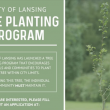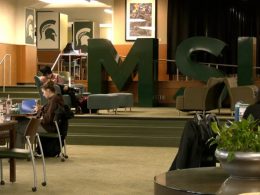Lansing, MI – A proposal by the Michigan Department of Natural Resources (DNR) to lease 420 acres of state land near Gaylord for a solar farm has sparked controversy and raised questions about the best way to balance renewable energy development with environmental conservation.
The plan, which is still under consideration, has faced strong opposition from local lawmakers, particularly Republican representatives, who are calling for action against the proposal. Rep. Ken Borton (R-Gaylord), whose district includes the proposed site, voiced concerns from local residents who fear the solar farm could damage the region’s natural beauty and reduce property values.
“I’ve actually talked with neighbors whose property abuts this. They’re very concerned now what’s going to happen to their property value if all those trees they’re enjoying now get bulldozed,” Borton stated, emphasizing the emotional and economic stakes for local communities.
The DNR has indicated it may hold a public comment period to gather feedback on the proposal, but a new state law passed in 2023 could give the state the final say on such projects, overriding local government decisions on renewable energy developments like wind and solar farms.
Doug Bessette, an Associate Professor at Michigan State University’s Department of Community Sustainability, acknowledged the importance of reducing greenhouse gas emissions but cautioned against the environmental impact of converting forestland for solar energy. Bessette referred to national research showing that clearing forests for solar farms could potentially lead to increased emissions, undermining some of the anticipated environmental benefits.
“We need to find ways to address the growing demand for electricity, particularly with the rise of AI and electrification of vehicles,” Bessette said. “But removing forested areas for solar projects may not be the most effective solution.”
A recent national survey conducted by MSU found that 75% of people opposed placing solar panels on forested land, reflecting public sentiment about preserving natural spaces. The survey also highlighted a desire for more community involvement in the planning processes for renewable energy projects, a sentiment reflected in the backlash against the DNR’s proposal.
Rep. Borton, while researching the solar farm in Gaylord, discovered a second, larger solar farm project already underway in nearby Roscommon County. The DNR has leased 1,011 acres of land for this project, which further raised concerns about the scale and environmental impact of the state’s renewable energy initiatives.
As the debate continues, lawmakers, including Borton, are pushing for a halt to both the Gaylord and Roscommon County solar projects until further discussions can take place. Borton said that lawmakers will send another letter to the DNR urging them to pause the projects and review their authority to approve such large-scale developments without broader community input.
“We’re going to take a look at their authority, their ability to do it. We’re going to say, ‘halt, do not do any more until we come to the table and we can sit down and figure out what’s going on,’” Borton explained.
The DNR has not responded to requests for comment on the ongoing situation.
The conflict over this solar farm proposal in northern Michigan underscores the growing tension between the push for renewable energy and the need to preserve valuable natural resources. As the state continues to pursue green energy solutions, the debate surrounding this project may shape future discussions on how to balance the needs of energy development with environmental protection.












